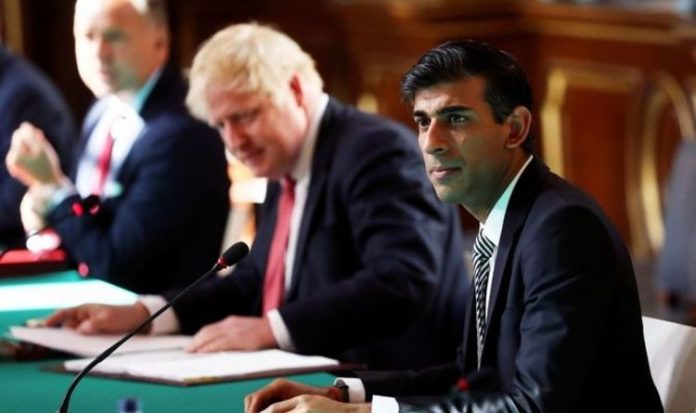Chancellor Rishi Sunak has been urged to use the upcoming Budget in November to axe the eye-watering £15billion a year spend in order to help fund the UK’s huge coronavirus crisis bill, while the money saved could also be used to fund Foreign Office and Ministry of Defence projects. The UK is legally required to spend 0.7 percent its economy’s GDP on foreign projects and some of the world’s richest countries, including China and India, have benefited from taxpayers’ money. Earlier this month, Foreign Secretary Dominic Raab said the Government remains committed to this GDP target, adding it is a manifesto commitment that was written into law.
BREXIT BULLETIN: Sign up for our special edition newsletter with exclusive insight from this week’s crunch talks
But in July, the annual report from the Department for International Development (DfID) revealed a staggering £71million of taxpayers’ money was sent to China in just one year, despite Beijing having the second-largest economy in the world.
The massive total was sent via a combination of direct British aid and a share of funding the UK gives to the likes of the United Nations and EU, who then distribute it.
Mr Raab said around £3billion would be cut from the aid budget next year, with the axe falling on countries such as China.
The Chancellor could use the Budget in November to announce a raft of spending cuts and further tax hikes in another damaging blow to hardworking Britons.
Mr Harris-Quinney, chairman of the Bow Group think tank, told Express.co.uk: “I think the British public already are very angry about the billions of pounds the UK is spending on foreign aid.
“However many still don’t realise the sheer scale of it, or the extent to which that amount of money could alter the outcome for our many domestic problems.
“The Bow Group has opposed international aid since its inception, but I think Dominic Cummings has clocked on to the fact that this policy was always a vote loser for the Conservatives, and other members of the government are slowly catching up to that reality, albeit later.
“International aid was completely unjustifiable before we entered the pandemic and recession. For it to continue while tax rises and spending cuts are being proposed would be a disgraceful mockery of the British public.”
Mr Harris-Quinney is also urging the Government to completely abolish the UK’s foreign aid programme, raging the system is a prime example of “poor people being taxed in rich countries”.
He continued: “We are consistently told that the international aid budget has many benefits to the UK.
“In spending £15 billion a year you would certainly expect some benefits, but I have seen no evidence of return on the scale of investment we have been making.
“Foreign aid is poor people being taxed in rich countries to send money to rich people in poor countries.
“The Chinese and Indian Governments have space programs more advanced than we do, they do not need the taxes of hard working Brits to help them pay for it.
“It’s unjustifiable, and especially so given the real reasons behind its implementation.
“It should be completely abolished.”
In June, Boris Johnson scrapped the Department for International Development – which was responsible for foreign aid – and merged it with the Foreign Office.
The Prime Minister said at the time: “The UK possesses the third biggest aid budget and diplomatic network in the world.
“We owe it to our people to make the best use of these assets.
“For too long frankly UK overseas aid has been treated as some giant cashpoint in the sky that arrives without any reference to UK interests or to the values the UK wishes to express or the priorities diplomatic political or commercial of the Government of the UK.
“The British taxpayer has a right to expect that we will achieve the maximum value for every pound that we spend.”







